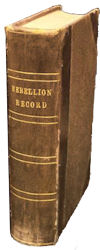—The forty-seventh annual meeting of the American Baptist Missionary Union, was held in the Pierrepont Street Baptist Church, Brooklyn, Ex-Gov. Briggs, of Massachusetts, in the chair. The exercises were opened with prayer by the Rev. Dr. Welch. The Chairman then addressed the meeting at some length, setting forth the object for which they had assembled. In reference to the present state of the country, he said that soldiers were now to be seen in every direction, flags were floating from every window in every street, old and young were rallying round the standard of the Government to sustain order and law, but amid all this outburst of enthusiasm the Prince of Peace must not be deserted. He was sure that the cause of all our difference with the South was owing to their misapprehension of the sentiments of the North, and he believed that if the heart of the North could be unveiled to their brethren of the South, all our national troubles would cease at once. Speaking of the charge made against the North by the Rev. Dr. Fuller of Baltimore—that the bad men of the North, the pastors, the churches, and the politicians, all united in crying for blood—for the blood of the Southern people, he inquired if this was the case? The congregation at once responded a vigorous “No.” “No,” said he, a more cruel, more unfounded charge never issued from the mouth of man. He denied that any such sentiments as Dr. Fuller had imputed to the North were entertained by Northern Christians. He hoped that the Union would place their sentiments on this subject on record, that the world might judge between truth and error.—N. Y. Tribune, May 29.
—The Ninth New York Regiment, which was the first to offer their services to the Government, arrived at Washington. Having enlisted for three years, they lose their identity as State militia, and at once enter service as United States troops. Eight hundred of them are fully uniformed, and will prove a valuable acquisition to the regular army.—(Doc. 206.)—National Intelligencer, May 29.
—A new military department is formed by Gen. Scott, out of that portion of Virginia lying east of the Alleghenies and north of James River, exclusive of Fortress Monroe and vicinity, and Brigadier General McDowell is appointed to its command. His staff consists of Colonel P. Stone, Fourteenth Infantry, who has recently rendered inestimable services in organizing the District of Columbia Militia; Captain B. O. Tyler, Brevet Captain James B. Fry, and Lieutenant Putnam, of the Topographical Engineers. —N. Y. Herald, May 29.
—The blockade of the port of Savannah was initiated by the U. S. gunboat Union.—Savannah Republican, May 31.
—Brigadier-General Pierce, Massachusetts Militia, was appointed to succeed Gen. Butler, promoted. He left for Washington immediately. Col. Waite, Major Sprague, and the other officers who were captured in Texas, and liberated on parole not to serve against the Confederate States, reached Washington, and reported to the War Department. Col. Lefferts, at Battalion Drill, took the sentiment of the Seventh N. Y. S. M., about remaining until ordered home by Government, their time having expired. Furloughs were offered to all who wished, but only five out of 1,225 asked for them.—N. Y. Times, May 29.
—In the case of Gen. Cadwallader, whose arrest for contempt of Court was ordered, the Marshal reported that, on going to Fort McHenry, he was refused admittance.—(Doc. 207.)
—The Chautauqua Volunteers, under the command of Capt. James M. Brown, left Jamestown, New York, for active service.—Chautauqua Democrat, May 29.
—In the English House of Commons, a debate on British relations with America took place, being opened by a communication from Lord John Russell concerning the blockade. Lord John stated that Lord Lyons had properly said to Admiral Milne that the blockade, if sufficient, must be respected. Mr. T. Duncombe spoke with some warmth on the treatment which British subjects received in the Southern States, and commented with great severity on the piratical offer of $20 per head offered by the rebels for every person killed on board an American vessel. The debate was further continued by Mr. B. Osborne, Mr. Bright, Mr. Gregory, and Mr. Bouverie. Mr. Gregory treated the reported offer spoken of as a newspaper rumor, and declared that he should, on the 7th, press his motion for the acknowledgment of the “Confederate States.”—(Doc. 207½.)
—Judge Hall’s charge to the grand jury at Rochester, N. Y., on the law of treason, was published.—N. Y. World, May 28.
—Two letters from Edward Bates, Attorney-General of the United States, to John Minor Botts of Virginia, were made public.—(Doc. 208.)
—The assertion of the Governor of Georgia, that property of citizens of that State found in the State of New York is forcibly taken from its owners, is denied in a letter published this day, signed by the officers of seven New York banks.—(Doc. 209.)
—The Rochester Regiment, Colonel Quimby, and the Syracuse Regiment, Colonel Walrath, left Elmira, N. Y., for the seat of war.—Buffalo Courier, May 31.
—The Garibaldi Guard, under the command of Colonel D’Utassy, left New York for the seat of war.—(Doc. 210.)



